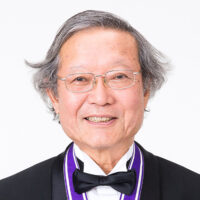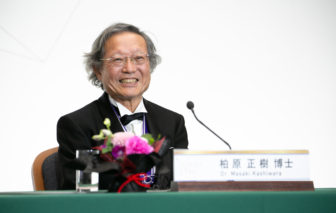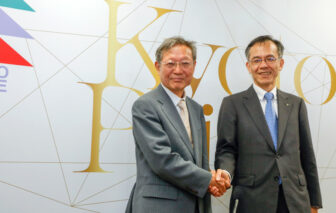
2018 Kyoto Prize Laureates
Mathematical Sciences(including Pure Mathematics)
/ Mathematician
1947 -
Project Professor, Research Institute for Mathematical Sciences, Kyoto University
Fifty Years with Algebraic Analysis
2018
11 /11 Sun
Place:Kyoto International Conference Center
Perspectives in Algebraic Analysis
2018
11 /12 Mon
Place:Room420, Research Institute for Mathematical Sciences, Kyoto University
Dr. Kashiwara established the theory of D-modules, thereby playing a decisive role in the creation and development of algebraic analysis. His numerous achievements—including the establishment of the Riemann-Hilbert correspondence, its application to representation theory, and contribution to crystal basis theory—have exerted great influence on various fields of mathematics and contributed strongly to their development.
Dr. Masaki Kashiwara has numerous outstanding achievements including the theory of D-modules, which forms the core of algebraic analysis. Developing this theory from its foundation, he applied it across various fields of modern mathematics.
Algebraic analysis is the study of objects in analysis such as differential equations by using the methods of modern algebra. In his earlier studies, Dr. Kashiwara, jointly with Dr. Mikio Sato and Dr. Takahiro Kawai, completed the classification theory of systems of linear partial differential equations (1). In algebraic analysis, systems of linear differential equations are studied as modules over a ring D of differential operators, that is, as D-modules. Establishing the basic theory of D-modules all alone, Dr. Kashiwara laid the foundation for its subsequent development.
One of his most remarkable achievements is the construction of the Riemann-Hilbert correspondence. To each linear differential equation is associated the concept of monodromy group, a topological datum which measures the multi-valuedness of its solutions. The Riemann-Hilbert problem asks the converse, namely whether there exists a linear differential equation which has a given monodromy group. It had been solved affirmatively in dimension one. The case of higher dimensions had been a longstanding issue, to which Dr. Kashiwara provided an ideal answer in terms of D-modules (2, 3). This is a beautiful synthesis of geometry, algebra and analysis. Dr. Kashiwara and his collaborator were one of the two research groups who solved the Kazhdan-Lusztig conjecture as an important application of the Riemann-Hilbert correspondence to representation theory (4). Furthermore, the collaborative research on the extension to infinite dimensional Lie algebras (5, 6) became a key step in completing the Lusztig program on representations of algebraic groups in positive characteristic.
Theory of crystal bases of quantum groups is another important achievement of Dr. Kashiwara in representation theory. Quantum groups are a deformation of Lie algebras by a parameter q. Dr. Kashiwara found that a significant simplification occurs in the limit where qbecomes 0 and introduced crystal bases at q= 0 with a combinatorial graph structure, which reduced many problems in representation theory to combinatorics (7). It makes theory of crystal bases a powerful tool in representation theory and integrable systems. Dr. Kashiwara further showed that crystal bases uniquely extend to global crystal bases defined for an arbitrary value of q(8), which turned out to coincide with the canonical bases introduced by Dr. Lusztig in 1990 for both q= 0 and global cases from a completely different viewpoint.
Dr. Kashiwara has made a wide range of contributions, often collaborating with many coauthors. Some of his outstanding achievements include developing microlocal analysis of sheaves (9, 10). Even today, he continues to contribute to his field with important results such as the extension of the Riemann-Hilbert correspondence to irregular singularities (11).
For these reasons, the Inamori Foundation is pleased to present the 2018 Kyoto Prize in Basic Sciences to Dr. Masaki Kashiwara.
References
(1) Sato M et al. (1973) Microfunctions and pseudo-differential equations. In Lecture Notes in Math.287(Springer-Verlag, Berlin-Heidelberg-New York): 265
(2) KashiwaraM (1980) Faisceaux constructibles et systèmes holonômes d’équations aux dérivées partielles linéaires à points singuliers réguliers. InSéminaire Goulaouic-Schwartz, 1979–80, Exposé 19, École Polytechnique, Palaiseau.
(3) KashiwaraM (1984) The Riemann-Hilbert problem for holonomic systems. Publ RIMS, Kyoto Univ20: 319–
(4) Brylinski J-L & KashiwaraM (1981) Kazhdan-Lusztig conjecture and holonomic systems. Invent Math64: 387
(5) Kashiwara M & Tanisaki T (1995) Kazhdan-Lusztig conjecture for affine Lie algebras with negative level. Duke Math J77: 21–
(6) Kashiwara M & Tanisaki T (1996) Kazhdan-Lusztig conjecture for affine Lie algebras with negative level Ⅱ: Nonintegral case. Duke Math J84: 771–
(7) Kashiwara M (1990) Crystalizing the q-analogue of universal enveloping algebras. Comm Math Phys, 133: 249–
(8) Kashiwara M (1991) On crystal bases of the q-analogue of universal enveloping algebras. Duke Math J63: 465–
(9) Kashiwara M & Schapira P (1985) Microlocal study of sheaves. Astérisque128.
(10) KashiwaraM (1985) Index theorem for constructible sheaves. Astérisque130: 193–
(11) D’Agnolo A & Kashiwara M (2016) Riemann-Hilbert correspondence for holonomic D-modules, Publ Math-Paris123: 69–197.
Profile is at the time of the award.

Abel Prize for 2025 Is Awarded to Dr. Masaki Kashiwara!
Dr. Masaki Kashiwara, the 2018 Kyoto Prize laureate in Basic Sciences, was awarded the Abel Prize, which recognizes mathematicians with extraordinary achievements.

Dr. Masaki Kashiwara Receives the Kyoto Prefecture Cultural Award!
Dr. Masaki Kashiwara, the 2018 Kyoto Prize laureate in Basic Sciences, was selected as the recipient of the 42nd Kyoto Prefecture Cultural Award (Distinguished Achievement) on January 5, 2024.

Dr. Kashiwara won the Chern Medal Award
International Mathematical Union (IMU) awarding the Fields Medal, Carl Friedrich Gauss Prize, and others announced to present the Chern Medal that is awarded to an individual whose accomplishments warrant the highest level of recognition for outstanding achievements in the field of mathematics to Dr. Masaki Kashiwara, the 2018 Kyoto Prize laureate in Basic Sciences, Project...